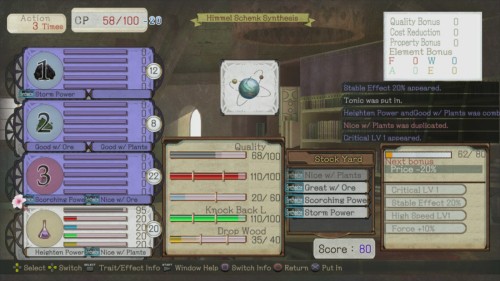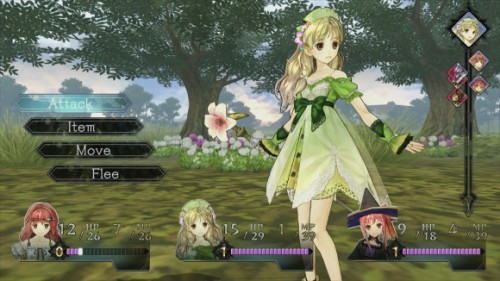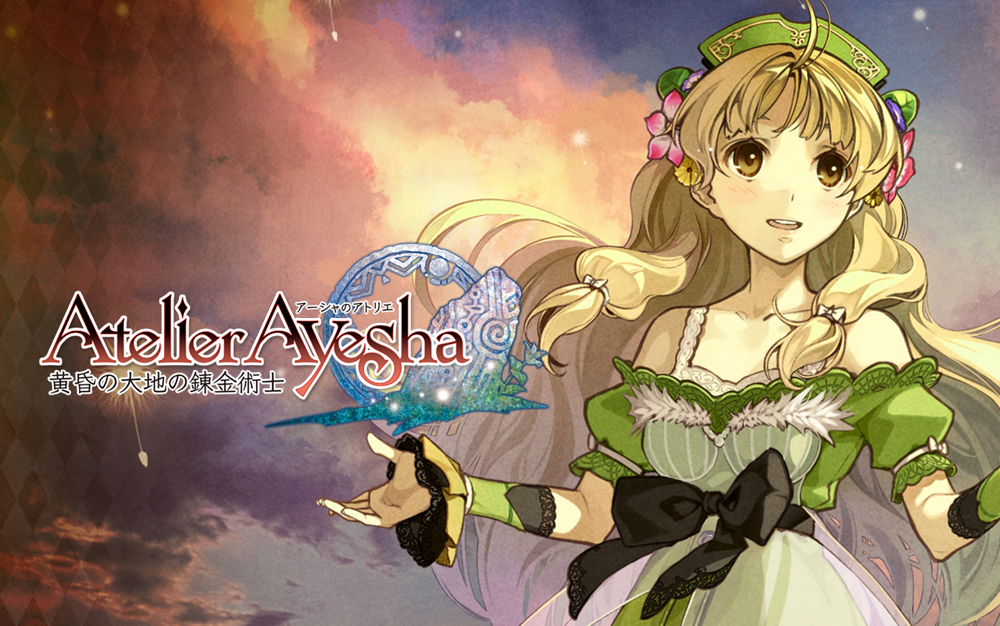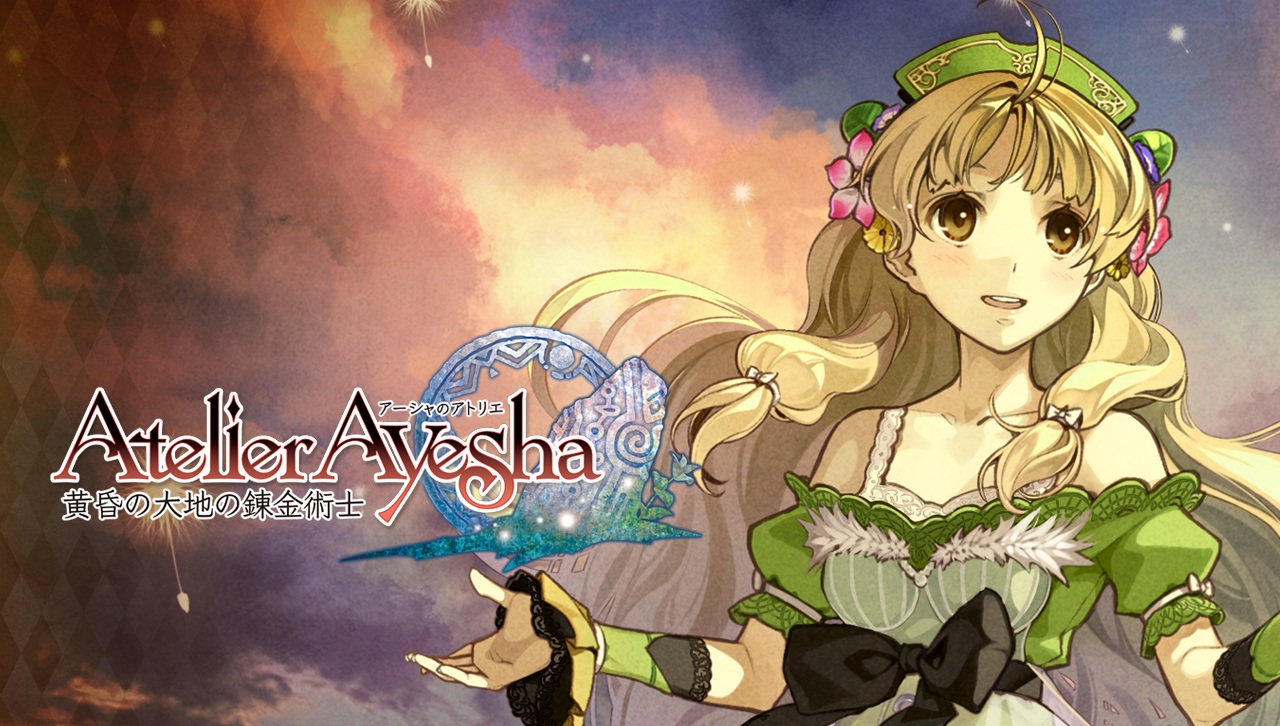
What a long time it’s been for the Atelier games. With 14 titles under the series’ belt spanning 16 years (do the math, people; that’s almost one game a year), it’s no wonder the Atelier games have such a cult following all around the world. The series’ latest offering, Atelier Ayesha: The Alchemist of Dusk, is something special in the sense that it features an all-new story separate from the other games in the series. In other regards? Unfortunately, not so much.
The story of Atelier Ayesha focuses on Ayesha, a young apothecary who makes medicine and lives alone ever since the death of her grandfather and disappearance of her sister, Nio. However, while visiting Nio’s grave one day, she encounters a spectral version of her, which convinces her that she is still alive. What’s more, the mysterious flowers blooming at her grave seem to hold a key to her disappearance and subsequent fate. With this in mind, Ayesha sets out on a quest to save her sister while developing her powers as an alchemist along the way. It’s a plot one has come to expect from a Japanese RPG like Atelier Ayesha and is thus passable, but unfortunately hampered by its cast. Ayesha comes across as a ditz lacking in self-confidence rather than a talented apothecary/alchemist, despite the fact that the game tries to make you think otherwise. The rest of the crew are no better, being more or less a set of characters picked from a stock-standard pool of personalities with various “quirks”. Making it even worse is the embarrassing voice acting which had me reaching for the mute button a fair number of times. To its credit, Atelier Ayesha is a very pretty game, making good use of cel-shading, although this is hampered by frequent frame-rate problems both in battle and during general exploration.
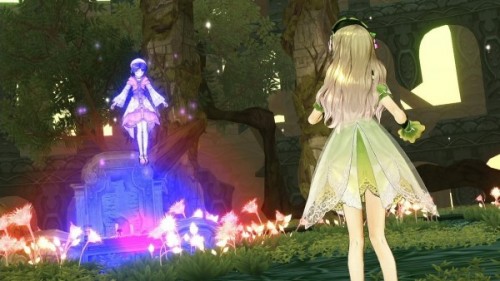
Obviously, the main focus of the game is alchemy, which is conducted with the use of ingredients and your cauldron, located in various rooms you can borrow throughout the game world. This is by far the most interesting part of Atelier Ayesha, with a huge number of ingredients to collect, create and refine. To add complexity, each ingredient has its own trait(s), which can be combined with others to increase or decrease the quality, effects and characteristics of a resulting item. Items are grouped into broad categories, with recipes only telling you which categories are needed to synthesise an item. This is what delivers such varied results in the items you craft and will have you constantly trying new combinations of items to improve the outcome each time; for example, using muddy water instead of pristine water in a synthesis will result in an item of poorer quality and lower selling price. It can be tricky to get a desired outcome, but doing the hard slog is definitely worth it, especially because some synthesisable items can be created to enhance your characters’ abilities and stats.
But of course, in order to synthesise items, you need the ingredients to let you do so to begin with. These are gathered throughout the world of Dusk, with the player being able to access a number of areas with ease via the game’s world map. The catch here is that travelling between areas and gathering ingredients is time-based, with time affecting the outcome of the main quest as well as any sidequests you wish to complete. Taking your time and exploring each area has its perks though, with the game rewarding you with various stat boosts if you gather ingredients in an area a certain number of times or defeat a certain number of enemy mobs.
With that said, battles can be fairly challenging, especially if you make the same mistake I did and neglect to level up your characters. Enemies appear on the field with battle only initiated if they come into contact with you, which is handy if you are low on health or prefer to just harvest ingredients uninterrupted. The combat system is a nice and simple turn-based affair, although the game does emphasise the important of positioning your character strategically in order to make each situation work to your benefit. For example, a back attack will deal more damage than an attack from the front on. This is important in regards to how enemies are placed too; some special attacks and items for instance, affect all enemies within a certain range, so the more that are clustered together, the better for you. As each turn passes, the bar below each character’s portrait will gradually build, which can then be used to support other characters or perform special functions. Interestingly, these are performed on a real-time basis, preventing you from become too complacent. Another interesting thing to note is that when each character has a turn in battle is determined by the type of action they took in the turn prior. In other words, a character who has unleashed a deadly special attack may end up having to make way for an enemy having a couple of turns in between before their next action. If there’s one complaint to be made about this system, it’s that the game doesn’t make it particularly clear how it works, although it isn’t too hard to figure out.
No matter what it is, almost anything you do in Atelier Ayesha results in you gaining some memory points, from talking to minor NPCs to completing a major quest branch. These points can then be used to record your thoughts in your diary, which serves to not only log important events relating to the main storyline but also rather trivial ones. Again however, this is worth your while, with the game coughing up various benefits ranging from stat boosts to the ability to flex your alchemical muscles a little more.
Atelier Ayesha boasts a fascinating alchemy system and for that alone, I would recommend it to people who love getting obsessive-compulsive and sinking time into that kind of thing. As for the rest of the game however, I can’t say the same. I’ve always felt that in the case of the JRPG genre, characters are paramount to the enjoyment of the experience but in Atelier Ayesha, they did nothing but bore and annoy. As a result, Atelier Ayesha ends up being a rather average game, although the gameplay makes it clear that it has its heart set in the right place.
Alchemy is lots of fun | Refreshingly simple battle system
Obnoxious characters | Horrid framerate | Terrible voice acting

